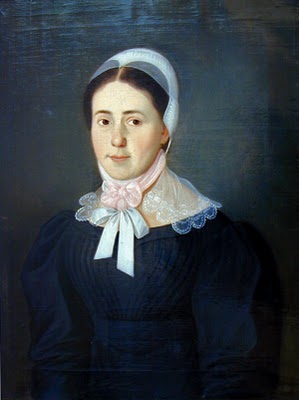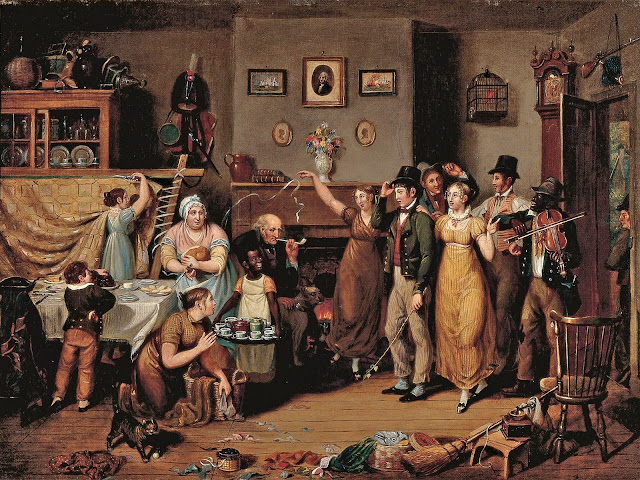Charles Fraser (1782-1860) Church at St. Andrews. South Carolina
Pavel Petrovich Svinin (Russian-born American genre artist, 1787-1839) A Philadelphia Anabaptis Immersion during a Storm
William Russell Birch (English artist, 1755-1834) High Street, with the First Presbyterian Church. City of Philadelphia in the State of Pennsylvania, North America, as it appeared in the Year 1800
Asher Brown Durand (American artist, 1796-1886) Sunday Morning 1839
Unknown Artist, Moravian Single Sister, ca. 1810-1820
1836 J. C. Bridgewood (American artist, 1800s) Saint John's Church
John Eastman (American Painter, fl 1842-1880) The Lord is My Shepherd
Charles Fraser (1782-1860) Church at St. James at Goose Creek, South Carolina
Pavel Petrovich Svinin (Russian-born American genre artist, 1787-1839) ) Black Methodists Holding a Prayer Meeting
William Russell Birch (English artist, 1755-1834) Old Lutheran Church in Fifth Street, Philadelphia.
John Eastman (American Painter, fl 1842-1880) Sunday Morning
Charles Fraser (1782-1860) View of St. James Goose Creek
Henry Bacon (American-born artist, 1839-1912) Pay Attention
Charles Fraser (1782-1860) Meeting House near Jacksonborough, South Carolina
Carl Christian Anton Christensen (Danish-American artist, 1832-1912) - Burning of the Nauvoo, Illinois Mormon Temple in 1848 Destruction of the Mormon Temple (from the Nauvoo Patriot, Nauvoo, Illinois) "November 19, 1848: On Monday the 19th of November, our citizens were awakened by the alarm of fire, which, when first discovered, was bursting out through the spire of the Temple, near the small door that opened from the east side to the roof, on the main building. The fire was seen first about three o'clock in the morning, and not until it had taken such hold of the timbers and roof as to make useless any effort to extinguish it."
+Church+at+St.+Andrews.+Carolina+Art+Association+Gibbs+Museum,+Charleston,+SC+-+Copy.jpg)
++A+Philadelphia+Anabaptis+Immersion+during+a+Storm.jpg)
+High+Street,+with+the+First+Presbyterian+Church.+City+of+Philadelphia+in+the+State+of+Pennsylvania,+North+America,+as+it+appeared+in+the+Year+1800.jpg)
+Sunday+Morning+1839.jpg)

+Saint+John's+Church.jpg)
+The+Lord+is+My+Shepherd.jpg)
+Church+at+St.+James+at+Goose+Creek.+Carolina+Art+Association+Gibbs+Museum,+Charleston,+SC.jpg)

+Old+Lutheran+Church+in+Fifth+Street,+Philadelphia.+City+of+Philadelphia+in+the+State+of+Pennsylvania,+North+America,+1800.jpg)
+Sunday+Morning.jpg)
+View+of+St.+James+Goose+Creek+from+the+Parsonage.jpg)
+Pay+Attention.png)
+Meeting+House+near+Jacksonborough.+Carolina+Art+Association+Gibbs+Museum,+Charleston,+SC.jpg)
+-+1800s+Burning+of+the+Nauvoo,+Illinois+Mormon+Temple+in+1848.jpg)



+from+Delaware.jpg)
+Cracking+Nuts+1856.jpg)
++++The+Girl+Holding+the+Dog.jpg)
++++Woman+By+A+Window+Feeding+Her+Dog+1880.jpg)
+++Simone+In+A+Large+Plumed+Hat+Seated+Holding+A+Griffon+Dog.jpg)
+++Woman+In+Raspberry+Costume+Holding+a+Dog++1900.jpg)
+++Woman+On+A+Striped+With+A+Dog+or+Young+Woman+On+A+Striped+Sofa+With+Her+Dog.jpg)
++A+Girl+Holding+the+Dog.jpg)
++Elsie+Cassatt+Holding+a+Big+Dog+1880.jpg)
++Sara+in+a+Large+Flowered+Hat+Looking+Right+Holding+Her+Dog+1901.jpg)
++Marie+Louise+Durand+Ruel+1911.jpg)
++Sara+With+Her+Dog+in+an+Armchir+Wearing+a+Bonnet+with+a+Plum+Ornament+1901.jpg)
++Young+Girl+at+a+Window+1883.jpg)
+Sunset+Musings+1887+(2).jpg)
+Mrs+Robert+Lowden.jpg)
+Mrs+Robert+Donaldson+(Susan+Jane+Gaston)+(2).jpg)
++Frances+Kemble+Butler.jpg)
+Lady+with+a+Mask+1841.jpg)
+Susan+Walker+Morse+The+Muse+(2).jpg)

 William Hahn (American artist, 1829–1887) The Convalescent
William Hahn (American artist, 1829–1887) The Convalescent Louis Lang (Amreican artist, 1814–1893) The Sewing Party
Louis Lang (Amreican artist, 1814–1893) The Sewing Party William Hahn (American artist, 1829–1887) Forbidden To Go Sleigh Riding
William Hahn (American artist, 1829–1887) Forbidden To Go Sleigh Riding Luca Sacco (American artist, 1858–1912) The Fortune Teller
Luca Sacco (American artist, 1858–1912) The Fortune Teller Louis Lang (Amreican artist, 1814–1893) Women's Art Class
Louis Lang (Amreican artist, 1814–1893) Women's Art Class John Carlin (American artist, 1813–1891) After a Long Cruise
John Carlin (American artist, 1813–1891) After a Long Cruise Henry Bebie (Amerian artist, 1824–1888) The Sun
Henry Bebie (Amerian artist, 1824–1888) The Sun Henry Bebie (Amerian artist, 1824–1888) Conversation Group of Baltimore Girls
Henry Bebie (Amerian artist, 1824–1888) Conversation Group of Baltimore Girls Hal Morrison (American artist, 1848–1927) Weighing the Cotton
Hal Morrison (American artist, 1848–1927) Weighing the Cotton George Whiting Flagg (American painter, 1816–1897) The Chess Players
George Whiting Flagg (American painter, 1816–1897) The Chess Players Benjamin Henry Latrobe (British-born American architect & artist, 1764-1820) Preparations for the Enjoyment of a Fine Sunday among the Blacks of Norfolk.
Benjamin Henry Latrobe (British-born American architect & artist, 1764-1820) Preparations for the Enjoyment of a Fine Sunday among the Blacks of Norfolk. Albertus Del Orient Browere (American artist, 1814–1887) Goldminers
Albertus Del Orient Browere (American artist, 1814–1887) Goldminers Albertus Del Orient Browere (American artist, 1814–1887) At Home
Albertus Del Orient Browere (American artist, 1814–1887) At Home


 John Lewis Krimmel (German-born American artist, 1786-1821) Black Sawyers Working in Front ot the Bank of Pennsylvania, Philadelphia
John Lewis Krimmel (German-born American artist, 1786-1821) Black Sawyers Working in Front ot the Bank of Pennsylvania, Philadelphia John Lewis Krimmel (German-born American artist, 1786-1821) Blind Man's Bluff
John Lewis Krimmel (German-born American artist, 1786-1821) Blind Man's Bluff John Lewis Krimmel (German-born American artist, 1786-1821) Country Wedding 1820
John Lewis Krimmel (German-born American artist, 1786-1821) Country Wedding 1820 John Lewis Krimmel (German-born American artist, 1786-1821) Fourth of July in Centre Square Philadelphia, 1812
John Lewis Krimmel (German-born American artist, 1786-1821) Fourth of July in Centre Square Philadelphia, 1812 John Lewis Krimmel (German-born American artist, 1786-1821) In an American Inn 1814
John Lewis Krimmel (German-born American artist, 1786-1821) In an American Inn 1814 John Lewis Krimmel (German-born American artist, 1786-1821) Members of the City Troup and other Philadelphia Soldiery
John Lewis Krimmel (German-born American artist, 1786-1821) Members of the City Troup and other Philadelphia Soldiery John Lewis Krimmel (German-born American artist, 1786-1821) Merrymaking at a Wayside Inn
John Lewis Krimmel (German-born American artist, 1786-1821) Merrymaking at a Wayside Inn John Lewis Krimmel (German-born American artist, 1786-1821) Nightlife in Philadelphia - An Oyster Barrow in front of the Chestnut Street Theater
John Lewis Krimmel (German-born American artist, 1786-1821) Nightlife in Philadelphia - An Oyster Barrow in front of the Chestnut Street Theater John Lewis Krimmel (German-born American artist, 1786-1821) Pepper-Pot Woman at the Philadelphia Market. 1811
John Lewis Krimmel (German-born American artist, 1786-1821) Pepper-Pot Woman at the Philadelphia Market. 1811 John Lewis Krimmel (German-born American artist, 1786-1821) Philadelphia Election Day 1815
John Lewis Krimmel (German-born American artist, 1786-1821) Philadelphia Election Day 1815 John Lewis Krimmel (German-born American artist, 1786-1821) Sunday Morning in front of the Arch Street Meeting House in Philadelphia
John Lewis Krimmel (German-born American artist, 1786-1821) Sunday Morning in front of the Arch Street Meeting House in Philadelphia John Lewis Krimmel (German-born American artist, 1786-1821) The Sleighing Frolic
John Lewis Krimmel (German-born American artist, 1786-1821) The Sleighing Frolic John Lewis Krimmel (German-born American artist, 1786-1821) Young Girl With A Blue Dress
John Lewis Krimmel (German-born American artist, 1786-1821) Young Girl With A Blue Dress John Lewis Krimmel (German-born American artist, 1786-1821) The VillageTavern
John Lewis Krimmel (German-born American artist, 1786-1821) The VillageTavern John Lewis Krimmel (German-born American artist, 1786-1821) Wordly Folk Questioning Chimney Sweeps and Their Master Before Christ Church in Philadelphia 1811-13
John Lewis Krimmel (German-born American artist, 1786-1821) Wordly Folk Questioning Chimney Sweeps and Their Master Before Christ Church in Philadelphia 1811-13 John Lewis Krimmel (German American arttist, 1786-1821) The Quilting Frolic 1813
John Lewis Krimmel (German American arttist, 1786-1821) The Quilting Frolic 1813
+(2).jpg)
+Hop+Picking+1862.jpg)
+At+Camp+Spinning+Yarn+and+Whittling.jpg)
.++Husking+Bee,+Island+of+Nantucket.jpg)
++Quilting+Bee.jpg)
+Study+for+the+Cranberry+Harvest.jpg)
+Making+Ammunition+1855.jpg)
.++Sugaring+Off+at+the+Camp,+Fryeburg,+Maine.jpg)
+Women+Weaving+Baskets.jpg)
+Harvesting+Hops+near+Cooperstown,+New+York.jpg)
+The+Quilting+Frolic+1813.jpg)
.++The+Cranberry+Harvest,+Island+of+Nantucket.jpg)
+the-berry-pickers.jpg)
.+Sugaring+Off.jpg)
+Watermellon+Picking.jpg)
+The+Conversation.jpg)
+Flax+Scutching+Bee+1885.jpg)
+The+Maple+Sugar+Camp+Turning+Off.jpg)
+Mending+the+Net.jpg)
+Cranberry+Pickers.jpg)
+October.jpg)
+In+the+fields.jpg)
+Pushing+for+Rail.jpg)
+Sugering+Off+at+the+Camp+in+Freyeberg+ME.jpg)
+An+Important+Letter.jpg)
+At+the+Maple+Sugar+Camp.jpg)
+The+Sewing+Party.jpg)
+Women+in+the+Fields.jpg)
+Weaning+the+Calf.jpg)
+Waiting+for+an+Answer.jpg)
+Two+Girls+at+the+Beach,+Tynemouth.jpg)
+Three+Boys+in+a+Dory+with+Lobster+Pots+-+Copy.jpg)
+The+Woodcutter+-+Copy.jpg)
+The+Veteran+in+a+New+Field+-+Copy.jpg)
+The+Sick+Chicken+-+Copy.jpg)
+An+Interesting+Book.jpg)
+The+Scissors+Grinder+1870.jpg)
+A+Bedtime+Story.jpg)
+++Bluffing.jpg)
+At+the+Brook.jpg)
+The+Fisherman's+Lesson.jpg)
+Equestrian+Portrait.jpg)
+Ice+Skater+or+Child+Warming+Hands.jpg)
+Guilty.jpg)
+Asleep.jpg)
+One+for+Mommy,+One+for+Me.jpg)
+Trying+the+Pipe.jpg)
+Story+of+Golden+Locks.jpg)
+The+Bitter+Bit+1877.jpg)
+In+the+Hayloft.jpg)
+Young+Girl+Reading+1877.jpg)
++My+Best+Friend.jpg)
+Pulling+Out+the+Splinter.jpg)
+Little+Boy+on+a+Stool.jpg)
++Daisy+McComb+Holding+a+Pink+Rose.jpg)
+Lunchtime.jpg)
+++Tete+a+Tete.jpg)
+-scholar.jpg)
++The+Industrious+Family.jpg)
+The+Lesson.jpg)
+++The+Peacemaker.jpg)
+The+Little+Convalescent.jpg)
++Golden+Locks,+Left+Behind.jpg)
+The+Old+Stage+Coast.jpg)
+The+Orange.jpg)
++St+Patrick's+Day.jpg)
+The+Storyteller+at+the+Camp.jpg)
++Hiding+in+the+Old+Oak.jpg)
+The+Young+Sweep.jpg)
+Little+Drummer+Boy.jpg)
+the-boyhood-of-abraham-lincoln.jpg)

+What+the+Shell+Says.jpg)
++The+Windmill.jpg)
+The+Whittling+Boy+-+Copy.jpg)
++Getting+Ready+for+the+Market.jpg)
++The+Speculator.jpg)

+In+East+Tennessee.jpg)
+Published+by+N+Currier+The+Express+Trail+1864.jpg)

++Family+Life+on+the+Frontier.jpg)
+Published+by+N+Currier+The+Ferryboat+1864.jpg)

+Spinning+by+Firelight.jpg)
+Fishing+Along+the+Cache+River.jpg)
+Prairie+Burial.jpg)
+Courthouse+Rock+1861.jpg)
+The+Squatters.jpg)
++Just+Moved.jpg)
+_indian-scout.jpg)
++With+a+Prisoner.jpg)
+Away+Away+to+the+Mountain+Dell+-+The+Valley+of+the+Free+Immigrant+Train+1897.jpg)
+Shepherd+and+his+Flock+1893.jpg)
+The+Wounded+Hound.jpg)
+_the-chief.jpg)
+Richards'+Camp,+Holiday+Park,+Weber+Canyon+1888.jpg)
+Fishing+along+the+Jordan.jpg)
+The+Great+Salt+Lake+From+The+Foot+of+Ensign+Peak+1864.jpg)
+Wild+Duck+Shooting+on+the+Wing.jpg)
+the-hunt.jpg)
+The+Lazy+Fisherman.jpg)
+The+Trappers.jpg)
+Getting+the+Cattle.jpg)
+The+Fallen+Trapper.jpg)
+The+Expedition+Party.jpg)
+All+the+World's+a+Stage,+Liberty+Park+1893.jpg)
+Cattle+Drive+in+Southern+California.jpg)
+Native+Americans+in+a+Lunar+Eclipse.jpg)
+Yosemite+Valley+from+Glacier+Point.jpg)
+Wheat+Harvest+in+Salt+Lake.jpg)
+Harvest+Time.jpg)
+The+Wounded+Scout.jpg)

+Advice+on+the+Prairie.jpg)
+Trip+to+Galcier+Point.jpg)
+Return+from+Glacier+Point.jpg)
+Pacific+RR+Station+Sacramento.jpg)








